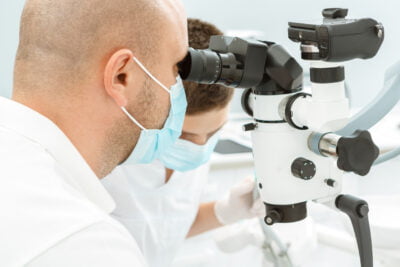 Cancer is a deadly disease that involves an uncontrollable growth of cells that invade and damage normal tissue. Oral cancer may affect any part of the mouth or surrounding areas, including the lips, tongue, cheeks, floor, hard and soft palate, pharynx (throat) and even the sinuses. Like most forms of this disease, oral cancer can be life-threatening if not caught early. However, if diagnosed at an early stage, it is a treatable disease.
Cancer is a deadly disease that involves an uncontrollable growth of cells that invade and damage normal tissue. Oral cancer may affect any part of the mouth or surrounding areas, including the lips, tongue, cheeks, floor, hard and soft palate, pharynx (throat) and even the sinuses. Like most forms of this disease, oral cancer can be life-threatening if not caught early. However, if diagnosed at an early stage, it is a treatable disease.
Who Is At Risk?
According to the American Cancer Society, men are twice as likely as women to develop oral cancer, and men over the age of 50 are most susceptible.
Other risk factors for developing oral cancer include:
- Smoking: Smokers are six times more likely than nonsmokers to develop oral cancer.
- Users of smokeless tobacco: Users of chewing tobacco, dip, or snuff are 50 times more likely than non-users to develop certain types of oral cancer.
- Excessive alcohol consumption: Chances of developing oral cancer increase six-fold for drinkers vs. non-drinkers.
- Human papillomavirus (HPV): HPV is one of the most common sexually transmitted diseases, infecting millions of Americans annually. In recent years, it has been determined that HPV is a leading cause of certain types of oral cancer.
- Excessive sun exposure: Unprotected exposure to the sun increases the risk of lip cancer.
- Family history: Genetics also play a role in a person’s risk for developing oral cancer.
Symptoms
Oral cancer may include one or more of the following symptoms:
- Lumps, bumps, sores or lesions in or around the mouth
- White, red, or speckled patches in the mouth
- Unexplained bleeding
- Numbness, tenderness, and/or pain in the mouth, jaw, neck, or other areas of the face
- Excessive pain or soreness in the throat
- Difficulty chewing or swallowing or speaking
- Hoarseness or a sudden change in voice
- Ear pain
Diagnosis and Treatment
One of your best defenses against oral cancer is a routine dental exam, where you will also be screened for the disease. In addition to a visual inspection, your dentist will feel for lumps or irregularities in the tissue surrounding the mouth.
If your dentist sees something suspicious, he or she can remove a small amount and send it to a laboratory to be tested. Should the tissue prove to be cancerous, your dentist and doctor will work together to develop the best possible treatment plan. It’s possible that radiation or chemotherapy may be needed to completely remove the disease; however, survival rates are excellent with an early and proper diagnosis.
Prevention
Certain lifestyle choices can greatly reduce your risk of developing oral cancer. These include:
- Giving up tobacco in all forms
- Avoiding excessive (binge) drinking
- Eating a well-balanced and nutritious diet
- Limiting exposure to the sun
- Avoiding risky sexual behavior
Additionally, regular oral examinations and cancer screenings take only a few minutes, but they could save your life. Why not make an appointment today? At the Yuba City Dentistry Group, your health – oral and otherwise – is our chief concern.


